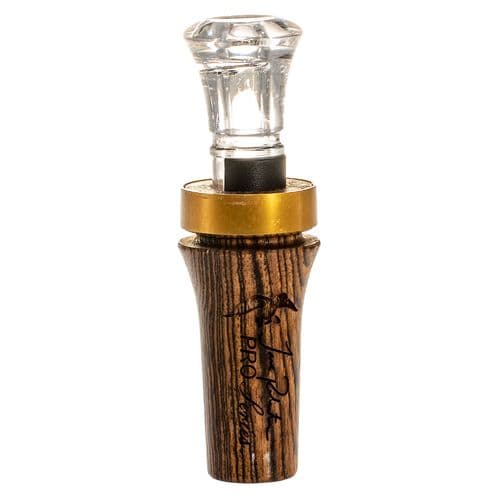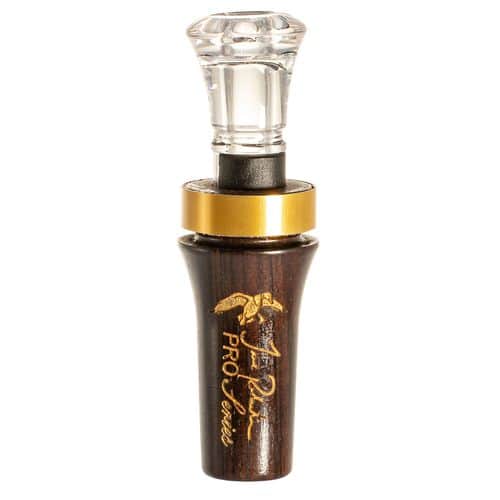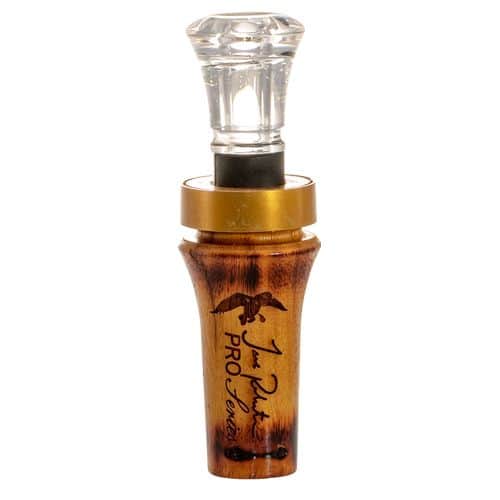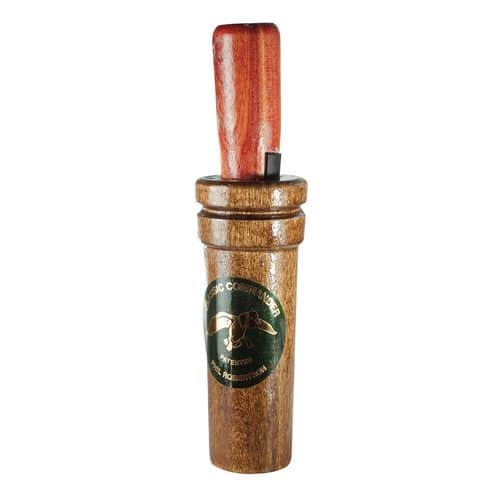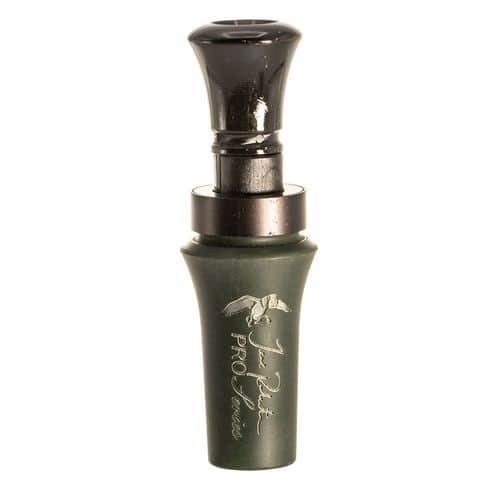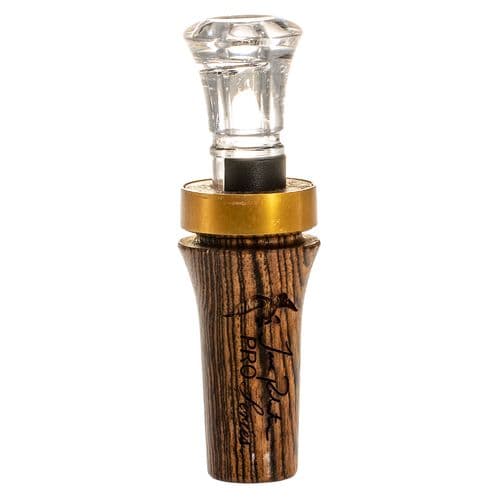
Duck Commander DCPROB Pro Series Bocote Double Reed Duck Call Mallard Wood Brown
$46.39
Please Allow 4-5 Business Days for In Store Pickup

Duck Commander DCPROB Pro Series Bocote Open Call: Master the Mallard Hen Sound for Unrivaled Hunting Success
For avid waterfowl hunters, the pursuit of success often hinges on one critical element: communication. Attracting wary ducks requires more than just a good setup; it demands the ability to speak their language. The Duck Commander DCPROB Pro Series Bocote Open Call is meticulously designed to provide hunters with the authentic, crisp mallard hen sounds necessary to draw in even the most cautious birds. This premium double-reed call, crafted from exquisite Bocote wood, is an indispensable tool for anyone serious about elevating their duck hunting game, whether you're a seasoned veteran looking for that perfect, nuanced sound or an enthusiastic newcomer eager to master the art of duck calling.
Is This the Right Duck Call for You?
If you've ever asked yourself questions like:
- "What's the most effective way to attract mallards to my spread?"
- "How can I make my duck calls sound more realistic and enticing?"
- "Which duck call will give me a competitive edge in various hunting conditions?"
- "I need a durable, high-performance call that offers consistent, reliable sounds."
- "What are the essential calls to master for successful mallard hunting?"
Then the Duck Commander DCPROB Pro Series Bocote Call is designed precisely for your needs. It's an exceptional choice for:
- Intermediate to Advanced Duck Hunters: Those who appreciate the intricate nuances of a high-quality wood call and seek precise control over their sounds to mimic a live mallard hen.
- Mallard Enthusiasts: Hunters who primarily target mallard hens and drakes, understanding the critical role of authentic hen vocalizations in drawing in these popular waterfowl.
- Hunters in Diverse Environments: The inherent durability of Bocote wood and the versatile double-reed design ensure exceptional performance across various weather patterns and hunting landscapes.
- Collectors of Fine Waterfowl Gear: Its striking aesthetic appeal, coupled with superior craftsmanship, makes it a prized and functional addition to any serious hunter's collection.
Unveiling the Power and Precision of the DCPROB Pro Series Bocote Call
At the core of the DCPROB Pro Series lies a harmonious blend of traditional craftsmanship and cutting-edge acoustic engineering, all working in concert to deliver unparalleled performance in the duck blind. This call represents Duck Commander's legacy of excellence, delivering a true-to-life sound profile that mallards simply cannot ignore.
The Exquisite Beauty and Superior Resonance of Bocote Wood
One of the most distinguishing characteristics of the DCPROB Pro Series is its construction from Bocote wood. This exotic hardwood, sourced primarily from Central and South America, is not merely visually stunning with its dramatic and unique grain patterns; it also possesses inherently superior acoustic properties that elevate its performance as a duck call.
- Rich, Mellow Tones: Bocote naturally produces a rich, deep, and incredibly realistic sound. Unlike some synthetic materials, wood calls—especially those crafted from dense hardwoods like Bocote—interact with moisture differently and resonate with a warmth and depth of tone that is remarkably challenging to replicate. This intrinsic quality helps produce the natural rasp and lifelike quack of a mallard hen, which is absolutely crucial for convincing wary ducks to commit to your spread.
- Exceptional Durability and Longevity: Despite its undeniable aesthetic appeal, Bocote is renowned for its remarkable durability. It is engineered to withstand the rigorous demands of duck hunting, exhibiting excellent resistance to warping and maintaining its structural integrity across a wide range of temperatures and humidity levels. With appropriate care, this call is built to be a trusted and effective companion for countless seasons.
- Unique Aesthetic Appeal: Every single Bocote call features a unique grain pattern, ensuring that each DCPROB Pro Series call is a truly one-of-a-kind instrument. This makes it not only a highly effective hunting tool but also a beautiful piece of functional art.
The Versatility and Ease of a Double Reed System
The double-reed configuration is a fundamental aspect of the DCPROB's design, offering significant advantages for callers of nearly all skill levels, from those just starting to those with years of experience.
- Easier to Master: Double reeds are generally more forgiving and less demanding to blow than single reeds. This design simplifies the process for callers to achieve a consistent, realistic sound without requiring excessive air pressure or highly advanced techniques. This makes the DCPROB particularly beneficial for individuals still honing their duck calling technique.
- Exceptional Realism: The precise interplay of the two reeds vibrating against each other generates a fuller, richer sound profile that meticulously mimics the complex, multi-tonal vocalizations of a real mallard hen with outstanding accuracy. This allows the caller to produce a wider spectrum of tones, ranging from soft, contented quacks to more aggressive, attention-grabbing comeback calls.
- Increased Control and Nuance: While often lauded for its ease of use, a double reed system also grants experienced callers a high degree of control over essential elements like volume, pitch, and inflection. This enables them to produce subtle and nuanced sounds that can be precisely adjusted in response to the ducks' observed reactions.
- Consistent Performance in Varied Conditions: Double-reed calls are typically less prone to "sticking" due to moisture buildup compared to some single-reed designs. This contributes to more consistent and reliable performance, especially critical during challenging, cold, or damp hunting conditions.
Precision Engineering for Authentic Mallard Hen Sounds
The DCPROB Pro Series is specifically engineered and tuned to replicate the distinct and irresistible calls of the mallard hen. Understanding why this focus is so crucial is key to its effectiveness:
- Dominant and Widespread Species: Mallards are consistently one of the most widespread and sought-after duck species for hunters across North America, and their vocalizations are universally recognized by other ducks.
- Powerful Attraction: A highly realistic mallard hen call is frequently the primary auditory signal that lures distant ducks into effective shooting range. Hens are the most vocal individuals within a flock, and their calls serve as essential signals for safety, the presence of food, and social companionship.
- Specific Sound Profile Tuning: This call is meticulously tuned to the natural frequency, cadence, and unique vocal qualities of a mallard hen. This meticulous attention to detail ensures that your calls sound like the genuine article, not just a generic duck sound, significantly increasing your chances of success.
The Advantage of an Open Call Design
The "open call" designation refers to the specific internal architecture of the call's tone board and bore. While technical details vary, in the context of duck calls, an "open" design generally implies several key benefits for the caller:
- Broader Vocal Range and Versatility: Open calls often permit a wider range of sounds and pitches, granting the caller more creative freedom to experiment with different mallard vocalizations. This includes everything from soft, subtle clucks to powerful, long-distance hail calls.
- Responsive Airflow and Crisp Notes: This design typically facilitates a more immediate and direct response to changes in air pressure from the caller's breath. This highly responsive characteristic allows for crisper, cleaner breaks in the sound, enabling the caller to produce sharp, realistic notes with precision and control.
Mastering the Art of Duck Calling with Your DCPROB Pro Series
Owning a high-quality duck call like the DCPROB is an excellent starting point; however, mastering its effective use is the next crucial step. Successful duck calling is a nuanced skill that is refined over time, requiring consistent practice, an understanding of duck behavior, and the ability to adapt to field conditions.
Essential Mallard Hen Calls to Practice for Optimal Performance:
To maximize your success with the Duck Commander DCPROB Pro Series Bocote Call, focus on diligently practicing and mastering these fundamental mallard hen vocalizations:
- The Basic Quack: This is the absolute foundation of all mallard calling. It's a sharp, distinct "quack!" sound used for general reassurance, to grab attention, or as a simple locator call. Practice varying the length, volume, and inflection of this single note.
- The Greeting Call (or Long-Distance Call): This consists of a series of 5-7 quacks, typically starting loud and gradually trailing off in both volume and intensity. An example cadence would be: "Quack, quack, quack, quack, quack..." This call is specifically used to get the attention of ducks that are far away or are passing by just outside your immediate range.
- The Comeback Call: A more urgent and intense variation of the greeting call, often delivered faster and with increased aggression. It's designed specifically to turn ducks that appear to be flying away from your position. An example would be: "Quack-quack-quack-quack!" followed by a few softer, reassuring quacks.
- Feeder Chatter (or Pleading Call): This involves a series of soft, rapid, guttural "dit-dit-dit" or "kip-kip-kip" sounds. This call effectively simulates the contented sounds of ducks feeding peacefully on the water and is exceptionally effective for drawing birds in close, particularly when they are circling your spread.
- The Lonesome Hen: This is a longer, more drawn-out single quack, sometimes concluding with a subtle moan at the very end. The sound evokes a sense of loneliness or being separated. "Quuaaack..." This call is often highly effective on single drakes or small groups of ducks searching for companionship.
Practical Tips for Effective Duck Calling in the Field:
- Practice Consistently: Consistency is paramount. Dedicate time to practice daily, not just in the weeks leading up to hunting season. Utilize audio guides, online tutorials, or recordings of actual ducks to fine-tune your ear and technique.
- Learn to Read the Ducks: Avoid overcalling. Continuously observe the ducks' reactions to your calls. If they are actively turning towards you or responding positively, continue calling. If they appear to be shying away or getting nervous, soften your calls, become more subtle, or even stop calling altogether. Remember, sometimes silence is the most effective call.
- Vary Your Calling Routine: Do not become monotonous by sticking to just one sound. Mix up greeting calls, comeback calls, and feeder chatter to mimic the dynamic and inviting sounds of a lively flock of ducks.
- Observe Live Ducks: Whenever possible, spend time observing live mallards in their natural habitat. Pay close attention to their vocalizations in different situations to truly understand the nuances and emotional context of their language.
- Utilize Diaphragmatic Breath: Effective calling originates from using your diaphragm to push air, not just your lungs. This technique provides the necessary power, control, and endurance for sustained calling sessions.
- Integrate with Your Decoy Spread: Your calling should seamlessly complement your decoy setup. Use your calling to strategically draw ducks into the most effective landing zone within your decoy spread, optimizing their approach for a successful shot.
Choosing the Right Duck Call: Why the DCPROB Stands Out from the Rest
When selecting a duck call, experienced hunters consider several critical factors. The Duck Commander DCPROB Pro Series Bocote Open Call consistently distinguishes itself as a premier choice for those prioritizing unparalleled realism, precise control, and robust durability.
- Call Material: While acrylic calls are known for producing loud, sharp, and crisp sounds, and polycarbonate calls offer a more affordable entry point, wood calls, particularly those made from Bocote, are highly prized for their authentic, natural, and often softer tones. These characteristics are especially effective in timber hunting scenarios and for close-in work where realism is paramount. The Bocote specifically offers exceptional resonance and a rich tonal quality.
- Reed Type: Single reeds typically offer a more pronounced rasp and higher volume but demand greater air control from the caller. In contrast, double reeds, as featured in the DCPROB, are generally easier to blow, more forgiving in technique, and excel at producing highly realistic hen sounds with less physical effort. This makes the DCPROB an ideal choice for both aspiring callers and seasoned hunters seeking reliable, consistent performance.
- Call Type: The "open call" design, as incorporated in the DCPROB, provides significant flexibility and a broad range of vocal expression.
- Target Species Optimization: The DCPROB is meticulously optimized for Mallard Hens, making it an incredibly effective and specialized tool for pursuing one of the most popular and abundant waterfowl species.
For hunters seeking a versatile, high-quality call that offers exceptional realism, precise control, and is a true pleasure to blow, the DCPROB Pro Series Bocote is a premier option that proudly continues the legacy of superior Duck Commander craftsmanship and innovation.
Integrating Your DCPROB Call into a Comprehensive Waterfowl Hunting Strategy
A superb duck call is an integral component of a larger, meticulously executed waterfowl hunting strategy. To truly maximize your success with the Duck Commander DCPROB, it's essential to consider how it seamlessly fits into your overall hunting approach:
- Strategic Decoy Spreads: Your expert calling will undoubtedly draw ducks closer, but your meticulously arranged decoy spread is what ultimately convinces them to land. Utilize a realistic spread of mallard decoys, paying careful attention to prevailing wind direction and identifying optimal landing zones. The DCPROB's authentic hen sounds pair perfectly with a convincing and dynamic decoy setup.
- Optimal Blind Concealment: Even the most effective calling technique can be nullified if ducks detect your presence. Ensure your hunting blind or natural cover provides optimal and complete concealment from all angles of approach.
- Thorough Scouting: The most brilliant calling in the world will not bring ducks to a location where they are not present. Dedicate ample time to scouting before your hunt to understand duck migration patterns, primary feeding areas, and preferred resting spots. Employ your call strategically only when you know ducks are in the immediate vicinity or are likely to pass through your area.
- Adapting to Weather Conditions: Adjust your calling style and intensity based on the prevailing weather conditions. On calm, clear days, ducks might be warier and more sensitive to sound, often requiring softer, more subtle calls. Conversely, on windy or cloudy days, you might need to employ louder, more aggressive calls to effectively cut through the elements and capture their attention.
- Ethical Hunting and Conservation: Always prioritize and adhere to ethical hunting practices. Only take clean, responsible shots within your effective range, meticulously retrieve all downed birds, and rigorously respect all wildlife regulations and bag limits. Duck Commander, as a pioneering brand in waterfowl hunting, has always championed conservation efforts, and every responsible hunter plays an undeniably vital role in preserving robust waterfowl populations and pristine habitats for the enjoyment of future generations.
Maintenance and Care for Your Duck Commander DCPROB Pro Series Call
To ensure your beautiful Bocote call performs optimally and reliably season after season, proper maintenance and diligent care are absolutely essential:
- Regular Cleaning: After each hunting excursion, carefully disassemble the call (if its design permits) and gently wipe away any accumulated moisture or debris from the reeds and the tone board. Always avoid using harsh chemicals or abrasive materials, which can damage the delicate components.
- Proper Storage: Store your call in a dry, temperate environment, ideally within a protective pouch or a dedicated call case, safely away from extreme temperatures, direct sunlight, and excessive humidity.
- Careful Handling: While Bocote is a remarkably durable wood, dropping the call or subjecting it to undue physical stress can potentially damage the delicate internal components or the exquisite wood itself. Handle your call with the care it deserves.
- Inspect Reeds Periodically: Regularly inspect the reeds for any discernible signs of wear, hairline cracks, or the accumulation of any debris. Replace reeds if they appear damaged or worn, as their condition directly impacts the call's sound quality and performance.
By investing in the Duck Commander DCPROB Pro Series Bocote Open Call Double Reed Mallard Hen Call, you're not merely purchasing a piece of hunting equipment; you're acquiring a masterfully crafted instrument specifically designed to deepen your connection with nature and significantly improve your success in the field. Its authentic sound, durable construction, and ease of use make it a truly standout choice for any dedicated duck hunter focused on the pursuit of mallards. This exceptional call is available at DEGuns and represents a profound commitment to quality and effective waterfowl communication, empowering you to truly speak the language of the ducks and bring them closer than ever before.
Product Specifications
| Feature | Detail |
|---|---|
| Brand | Duck Commander |
| Series | Bocote |
| Model | Pro Series |
| Color | Brown |
| Material | Wood (Bocote) |
| Sound Species | Mallard Hen |
| Call Type | Open |
| Reeds | Double |
| Hands Free | No |
| Species | Ducks |
| SKU | 111426 |
| UPC | 040444513995 |
| MPN | DCPROB |
Specifications
Explore the specific details and characteristics
- SKU
- 111426
- UPC
- 040444513995
- MPN
- DCPROB


